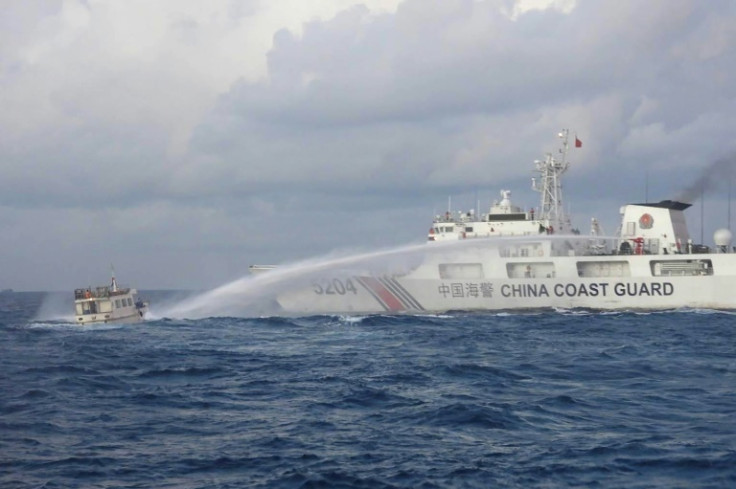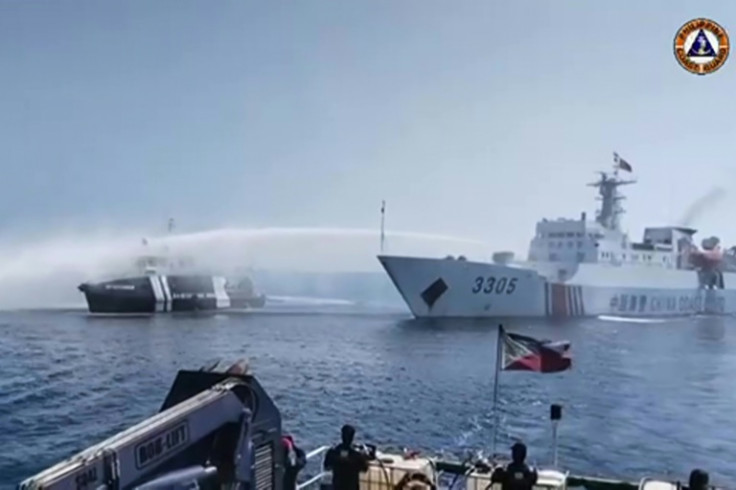
A Philippine boat and a Chinese Coast Guard ship collided near a hotly contested reef on Sunday, with both countries trading blame for the latest such confrontation in the disputed South China Sea.
The incident happened during a Philippine resupply mission to a tiny garrison on Second Thomas Shoal in the Spratly Islands, which is a flashpoint for Manila and Beijing.
It comes a day after the Philippines accused the Chinese coast guard of using water cannons to "obstruct" three government boats delivering provisions to Filipino fishermen near Scarborough Shoal, off the main island of Luzon.
Longstanding tensions between Manila and Beijing over the sea have flared in recent months following multiple incidents involving Philippine and Chinese vessels, including two previous collisions.
China claims almost the entire South China Sea, including waters and islands near the shores of its neighbours, and has ignored an international tribunal ruling that its assertions have no legal basis.
It deploys boats to patrol the busy waterway and has built artificial islands that it has militarised to reinforce its claims.
The Philippines said Sunday that "China Coast Guard and Chinese Maritime Militia vessels harassed, blocked, and executed dangerous manoeuvres on Philippine civilian supply vessels".
One of two boats carrying provisions was "rammed" by a Chinese coast guard ship, the National Task Force for the West Philippine Sea said in a statement.
A Chinese ship also used water cannon against the two supply boats and a Philippine Coast Guard vessel escorting the mission, the multi-agency task force said.
That caused "severe damage" to the engine of one of the supply boats and damaged the mast of the coast guard vessel, it said.
The China Coast Guard, however, accused the Philippine boat of "deliberately colliding" with the Chinese vessel after "disregarding our multiple stern warnings".
The Philippine boat "changed direction suddenly in an unprofessional, dangerous manner, deliberately colliding with our Coast Guard Vessel 21556, which was on a normal law enforcement route, and caused a scrape", the China Coast Guard said in a statement.
It took "control measures" against the other Philippine supply boat, which was allegedly "carrying construction materials" to the grounded warship on which the garrison is located.
Foreign diplomats in Manila were swift to criticise the Chinese actions.
US ambassador MaryKay Carlson said the United States stood with "the Philippines and partners in vehemently condemning the PRC's repeated illegal and dangerous actions against Philippine vessels", using the acronym for China's official name.

European Union ambassador Luc Veron said Sunday's incident was "deeply troubling", while the New Zealand embassy said the country was "deeply concerned at multiple incidents of dangerous actions towards the Philippines".
Hours after the latest incident, a convoy of civilian boats planning to deliver provisions to Filipino fishermen and troops in the South China Sea aborted the trip after "constant shadowing" by Chinese vessels, the organiser said.
The convoy, which departed the western island of Palawan early Sunday, had already changed course to avoid Second Thomas Shoal and go directly to Philippine-held Nanshan Island, where they would leave their cargo.
Second Thomas Shoal is about 200 kilometres (124 miles) from the western Philippine island of Palawan, and more than 1,000 kilometres from China's nearest major landmass, Hainan island.
A handful of Filipino troops are stationed on the crumbling BRP Sierra Madre, which the Philippine Navy grounded on the reef in 1999 to check China's advance in the waters.
The troops depend on the resupply missions for their survival.
One of the supply boats was able to deliver its cargo on Sunday, while the one involved in the collision was being towed by a Philippine Coast Guard vessel to Palawan, the task force said.
Relations between Manila and Beijing have deteriorated under President Ferdinand Marcos, who has sought to improve ties with traditional ally Washington and push back against Chinese actions in the South China Sea.
Marcos warned last month that the situation in the waters had become "more dire".







